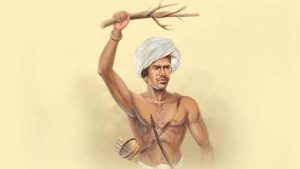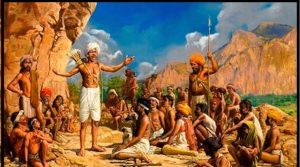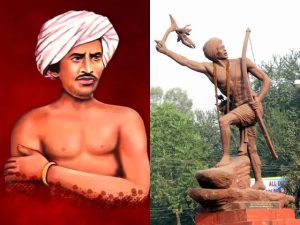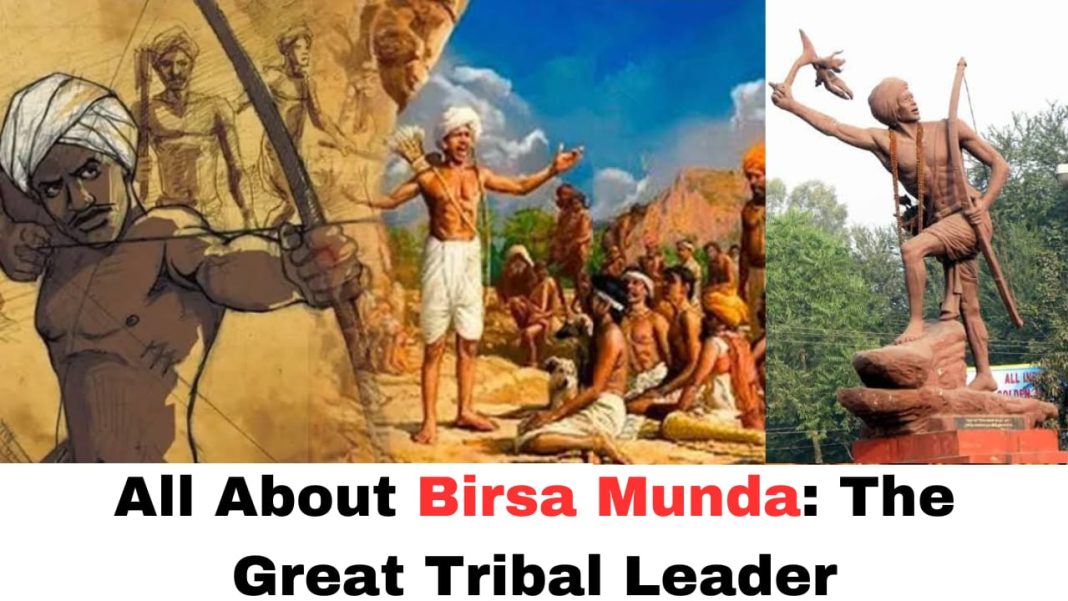Digital News Guru Education Desk:
Birsa Munda is remembered as a tribal freedom fighter and folk hero whose legacy is celebrated throughout India, particularly in the state of Jharkhand. His life and struggles have had a lasting impact on India’s history, especially in terms of empowering the tribal communities and fighting for their rights against British colonial oppression. Today, Birsa Munda’s legacy is honored not only by those who remember his fight but by an entire nation that recognizes his contributions to the larger Indian freedom movement.
Early Life and Background
Birsa Munda was born on November 15, 1875, in the small village of Ulihatu, located in the Chotanagpur Plateau region of modern-day Jharkhand. He was part of the Munda tribe, one of the prominent indigenous communities in the area. The Chotanagpur region, rich in natural resources, was home to several tribal groups who lived in harmony with nature and practiced subsistence farming.

From a young age, Birsa witnessed the exploitation of his people by British colonial authorities and local landlords. These injustices included forced land acquisition, harsh taxes, and oppressive laws that denied the tribals access to their own ancestral lands. This led to widespread suffering, poverty, and cultural disintegration among the tribes. Seeing these injustices deeply influenced Birsa’s early beliefs and aspirations, setting him on a path to lead a movement of resistance.
Spiritual Awakening and Leadership
During his youth, Birsa Munda was exposed to various cultural and religious influences. He attended a missionary school, which introduced him to Christianity and Western education. However, he soon began to reject the teachings that undermined tribal customs. Instead, Birsa found inspiration in his people’s indigenous spiritual practices and the need to preserve their cultural heritage. His spiritual awakening led him to become a religious leader, or bhagwan (god-like figure), for his community.
He taught his followers to purify themselves, abandon superstitions, and focus on living a life aligned with their cultural roots. His spiritual message spread rapidly, giving the tribal people a renewed sense of identity and purpose. By blending spirituality with a call to political action, Birsa Munda became a symbol of hope and unity for the Mundas and other tribal communities.
The Munda Rebellion: Fighting for Land and Freedom
By the late 1890s, Birsa Munda had mobilized a formidable resistance movement known as the Munda Rebellion or “Ulgulan,” which means “Great Tumult.” The rebellion was a reaction to the draconian laws imposed by the British and their collaborators, who had encroached on tribal lands for commercial gain. The British had introduced policies that converted tribal lands into properties controlled by zamindars (landlords) and restricted the use of forests, which were essential for the Mundas’ livelihood.

Birsa Munda’s followers, known as “Birsaites,” were inspired by his message of reclaiming their land and their rights. The movement was unique in that it combined spiritual revival with armed resistance. Birsa urged the tribals to uproot the British administration and establish a self-governing society based on Munda customs. The slogan “Abua raj seter jana, maharani raj tundu jana” (“Let the kingdom of the Queen end and our kingdom be established”) became the rallying cry of the rebellion.
Throughout 1899 and 1900, the Mundas launched attacks on police stations, missionaries, and symbols of British authority. The rebellion was fierce, but the British responded with overwhelming force. Despite being outmatched, Birsa’s movement made a significant impact and forced the colonial government to reconsider its policies toward tribal land ownership.
Arrest and Death
In February 1900, Birsa Munda was captured by British forces. He was imprisoned and, according to official records, died of cholera on June 9, 1900, while in custody. He was only 25 years old at the time of his death. However, suspicions of mistreatment and foul play linger, and his passing remains a subject of historical debate.
Despite his short life, Birsa’s influence did not fade away with his death. His movement led to some legislative changes, including reforms in land rights to prevent further exploitation of tribal territories. The government introduced the Chotanagpur Tenancy Act, which aimed to protect tribal lands from being transferred to non-tribals.
Birsa Munda’s Legacy
Today, Birsa Munda is celebrated as a tribal hero and a symbol of resistance against colonial and social injustices. His birth anniversary, November 15, is observed as “Birsa Jayanti” and has been designated as “Janjatiya Gaurav Divas” or Tribal Pride Day across India. This day is a moment to remember his contributions and the broader role of tribal communities in India’s history.

His legacy lives on in various forms. Schools, universities, and public places have been named in his honor, and his life story is part of educational curricula to inspire future generations. The state of Jharkhand, carved out of Bihar in 2000, is often seen as a tribute to Birsa Munda and his vision for tribal autonomy and rights.
Conclusion
Birsa Munda’s life was a testament to the power of resilience and the fight for justice. As a leader, he inspired his people to resist oppression and reclaim their cultural identity. His message of equality, respect for nature, and spiritual purity continues to resonate today. He is not just a historical figure but a guiding light for movements advocating for indigenous rights and social justice across the world.
In remembering Birsa Munda, we are reminded of the ongoing struggles faced by marginalized communities and the importance of standing up for what is right, no matter the odds.
You May Also Read: Delhi: GRAP-III Restrictions Activated as Delhi’s Air Quality Deteriorates








